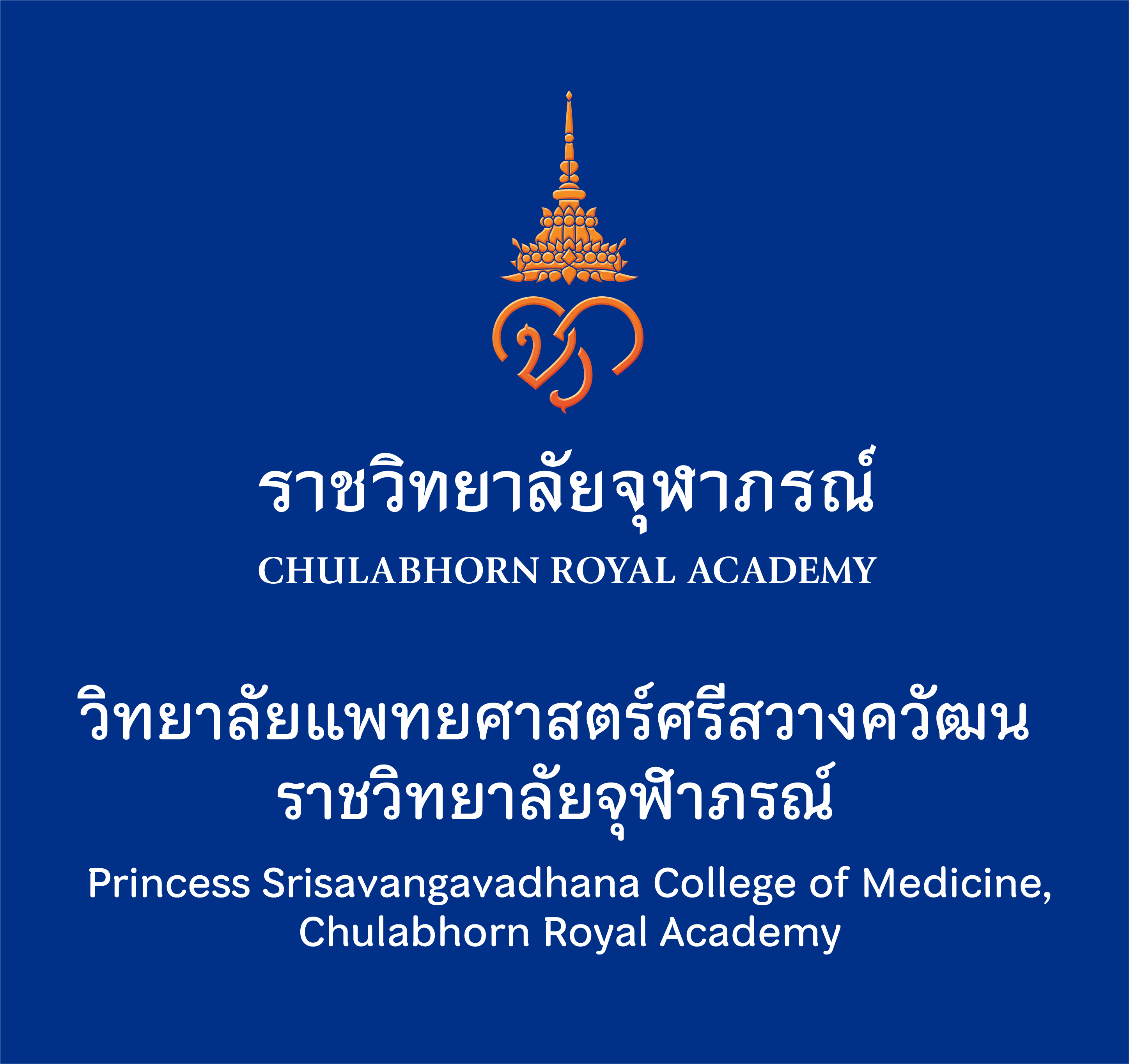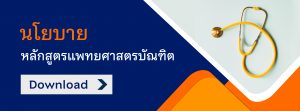Philosophy, justification and objectives of the curriculum
Chulabhorn Royal Academy (CRA) Doctor is a “socially responsible and highly competent patient-centred clinician who is capable of creating research and innovation for the betterment of society.”
According to the WFME Basic Medical Education Global Standards for Quality Improvement (2015 revision), the improved health of all peoples is the main goal of medical education. Currently, there are not enough physicians in Thailand to provide quality health care to the people. Even more lacking in Thailand are clinicians who understand scientific methods in depth and have the ability to perform original or advanced research for the advancement of medicine and improvement of society. This MD programme will not only produce highly competent and skillful physicians to provide quality health care to the people, but will also foster the ability to participate in the scientific development of medicine. Additional research and innovation year (year 4) is provided to all students for such purpose. The programme also fits well with the vision of the National Strategy of Thailand (2018-2037) aiming for Thailand to become a developed country through intensive research and innovation.
The MD programme at the Faculty of Medicine and Public Health, PCCMS aims to produce a distinctive CRA Doctor: a socially responsible and highly competent patient-centred clinician who is capable of creating research and innovation for the betterment of society.
The graduate will understand the health needs of Thailand and broader Southeast Asia region and be committed to improving the health of local populations.
The graduate will be well prepared for day-one competency as an intern and will have the foundation skills to become an outstanding clinician, a clinical entrepreneur and a medical leader of the future.
The graduate will be able to apply and develop research findings and innovations to health and well-being challenges in a way of delivering good care and health gain.
The overarching principles of the MD programme at the Faculty of Medicine and Public Health, PCCMS are:
- Integration: to support understanding and application of learning through organising it in a way that best supports the learner. Ensuring that all learning has a consistent focus on, and reference to, clinical practice.
- Competency focused: to ensure graduates are able to practice safety and learn through participation. Ensuring that graduates are well-functioning and capable members of healthcare teams from day 1 of practice who continue to learn during their professional careers.
- Research informed and research focused: ensuring graduates have the skills and orientation to be evidence-based practitioners and contribute to knowledge production in the discipline.
- Authentic assessment that promotes learning: using assessment in a way that promotes learning, that encourages self-assessment and life-long learning, and that utilises authentic and reliable assessment tools.
- Patient centred: learning focused on its application to clinical practice and aimed at understanding the patient as central to all medical practice. Encouraging the development of thinking and behaviours that go beyond service delivery. Developing individuals who are mindful of themselves, their fellow students and professionals, and their patients and their families.
- Developing the professional: learning how to be safe, efficient, reflective and compassionate doctors.
- Maximising the benefits of learning medicine at the Faculty of Medicine and Public Health, PCCMS: making use of contemporary learning resources, the multi-professional context of the health professions campus, the close associations within CRA, and the institutional vision of CRA.
- Student centred: using teaching and learning activities focused on student learning needs.
- Using IT technology to enhance the teaching and learning experience: using appropriate technological resources to improve the learning experience, to ensure graduates are able to use technology and informatics in their practice, and to continue to learn and develop as practitioners.
- Global and local: developing skills to be oriented to both global and local healthcare. Whist making use of international opportunities and understanding the global aspects of health and healthcare, they will be oriented to the health needs of Thailand and their duties to the Thai people.
The MD programme at the Faculty of Medicine and Public Health, PCCMS will be compliant with the Thai Ministry of Education/OHEC Quality Standards for Doctor of Medicine degree (2018) the requirements of The Medical Council of Thailand (TMC). Globally, medical education is increasingly becoming evidence-based. As a consequence there are now a number of robustly constructed national curricula guidelines for medicine developed through extensive consultation. There is a trend in all of these national curricula models towards: defining outcomes as competencies; integration of learning; and a focus on professional development.
PCCMS has entered into an academic collaboration with UCL Medical School to access expertise and resources to support them in the development and delivery of a high-quality and contemporary undergraduate medicine programme. Where appropriate, the Faculty of Medicine and Public Health, PCCMS will utilise UCL teaching and assessment resources to deliver the new PCCMS programme. The MBBS programme at UCL, that significantly informs this programme, is compliant with the UK General Medical Council (GMC) curriculum recommendation Tomorrow’s Doctors: Outcomes and standards for undergraduate medical education (GMC 2009). UCL Medical School meets the requirements of Promoting Excellence: Standards for Medical Education and Training (GMC 2015).







